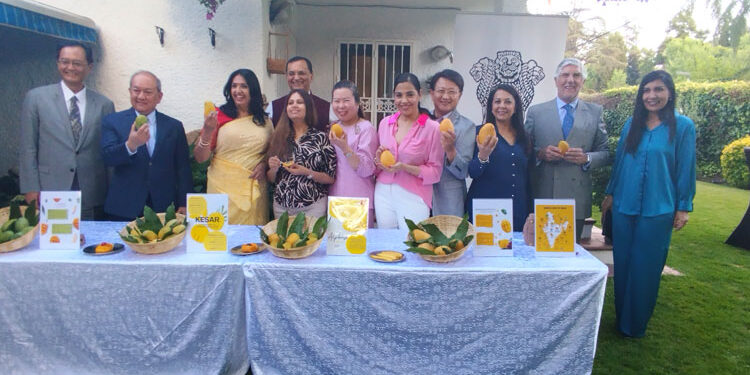Juan David Latorre
Mango, India’s national fruit, was the star of the party that the Indian Embassy hosted earlier this week at the residence of Ambassador Dinesh K. Patnaik and his wife, Pooman Patnaik.
Ambassadors from Portugal, Korea, Cyprus, Austria, Austria, Venezuela, Italy, Thailand, Nepal, Japan and Morocco were present and had the pleasure, together with a few other guests, to taste the different types of mango offered by the members of the Indian delegation, Langra, Alphonso, Kesar and Banganapalle, each one more delicious and tasty than the last. And all of them accompanied by Mango Lassi, a common Indian drink that is enjoyed as a pleasant refreshment on hot days.
As one can read on mango websites, to understand the love for mangoes in India, one ‘has to look much further back in the history of civilisation. In South Asia, mangoes have been cultivated for thousands of years and today, almost half of the world’s mangoes are grown in India alone, where it is the national fruit. It is safe to say that there is a great love for mangoes in India’.
Street markets for fresh produce in India are the places where mangoes are commonly found, brightening carts and stalls with their yellow, green and red hues. For the locals, mangoes are a common grocery item. Most bring mangoes home to include in their daily diet and cooking.
Indian cuisine, robust and diverse, includes mangoes in many dishes and pairings. Aamras is a thick mango pulp juice eaten with Chapati, a wheat flatbread, and Falooda is a popular dessert made with rose syrup, basil, jelly, noodles and, very often, mango.
In India, mangoes are also used for more savoury applications. South India is madly in love with Aavakaaya, an Indian pickle that is made from bitter, unripe mangoes. This type of mango is prepared mainly during the pre-summer seasons, when mangoes are about to ripen. In Andhra Pradesh, mango is often used in preparations of Dal, a spicy Punjabi dish cooked with lentils.
The surprise of all the attendees when they asked where they could buy such tasty and sweet delicacies was the reply of the Embassy staff, confirming that they have not yet been exported to Spain. Let’s hope it won’t be too long!










